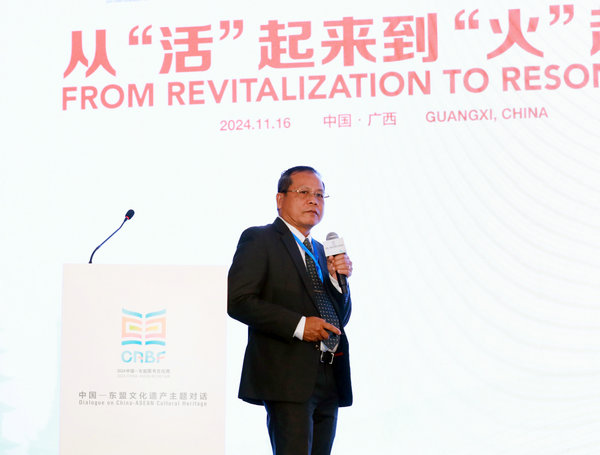

With the theme, "From Revitalization to Resonance," a dialogue among experts from China and countries of the Association of Southeast Asian Nations was held in Nanning, Guangxi Zhuang autonomous region on Nov 16.
Organized by the China Center for International Communication Development and the Guangxi Publishing & Media Group Co. Ltd.., the dialogue focused on enhancing exchange and cooperation in the field of cultural heritage between China and ASEAN countries.
In a video address, Shahbaz Khan, UNESCO's Director of the Regional Science Bureau for Asia and the Pacific, highlighted the universal significance of cultural heritage. He stated, "we believe that cultural heritage is a universal language, a language that speaks to our common humanity. It is a testament to the achievements of this human spirit, a bridge between generations and a source of inspiration and pride for our diverse cultures. The rich chemistry of cultural heritage in China and across the ASEAN region is a testament to the depths and the breadth of our shared history, and the potential for our collective future".
The dialogue featured sessions with experts in cultural heritage.

Huang Moqiao, Deputy Director of the Digital and Information Department of the Palace Museum, shared insights on the museum's cultural preservation efforts, particularly the development of a digital sharing platform for Palace Museum culture.
Som Sopharath, Director of the Department of Conservation of Monuments and Preventive Archaeology, APSARA National Authority, the Kingdom of Cambodia, discussed the conservation efforts at Angkor Wat and expressed gratitude for the Chinese teams that have provided technical support in restoring the ancient temples. "There are specialists in China dedicated to our program," Som noted. "They strengthen the bond of Cambodian-Chinese friendship."

The event also featured a round table discussion where experts shared insights from their respective fields, focusing on the role of youth in the protection, transmission, and innovative utilization of cultural heritage. The speakers emphasized the need to actively increase youth participation in heritage preservation, harness new media and technology to present cultural heritage in innovative ways, and encourage young people to take part in cultural heritage dissemination efforts.